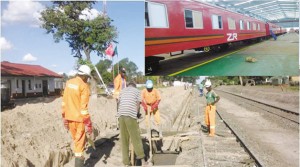
• Zambia Railways personnel working on the railway line in Mulobezi. (Inset) Some of the coaches that the railway company has introduced.
By XAVIER MANCHISHI-
GOVERNMENT is determined to revitalise the railway transport sector and reposition Zambia as a regional hub for business transactions to stimulate economic development, President Michael Sata has said.
President Sata noted that neighbours Angola and the Democratic Republic of Congo, had great potential to spur trade with Zambia.
Mr Sata said Government took over the management of the Zambia Railways Limited (ZRL) and immediately started the repositioning and expansion of the rail sector to significantly contribute to the country’s transport needs, particularly the long distance passenger and goods traffic.
In this vein, Mr Sata said on his Facebook page yesterday, that Government had through the ZRL revitalised the Mulobezi and Nacala Corridors links to provide reliable and cost effective bulk
transportation for the agricultural, mining and energy sectors as well as passengers.
“The development of our railway transport sector will ensure that the country becomes the hub for regional business transactions and thereby accelerate economic development in line with the PF Manifesto,” the President said.
He said there were five main Greenfield railway spurs that Government had proposed to develop in order to connect the country to all regional trade corridors.
These were the Chingola to Jimbe line in the north western part of the country, which would connect the country to Angola and the Democratic Republic of Congo (DRC).
“The trade potential from these two countries is immense,” Mr Sata said.
The Nseluka to Mpulungu line in the north would help open up markets in the Great Lakes region.
He said the Chipata to Mpika line located in the central eastern part of the country would also become an opportune route for business through the Mchinji line on the Nacala corridor.
He said the Kafue Lion Den line would link the country to the Beira Development Corridor which route should also provide significant transport savings for bulk export business.
He said the Livingstone to Katima-Mulilo rail line would link the country to Walvis Bay port in Namibia and reduce the cost of doing business especially in the western and southern part of the country.






